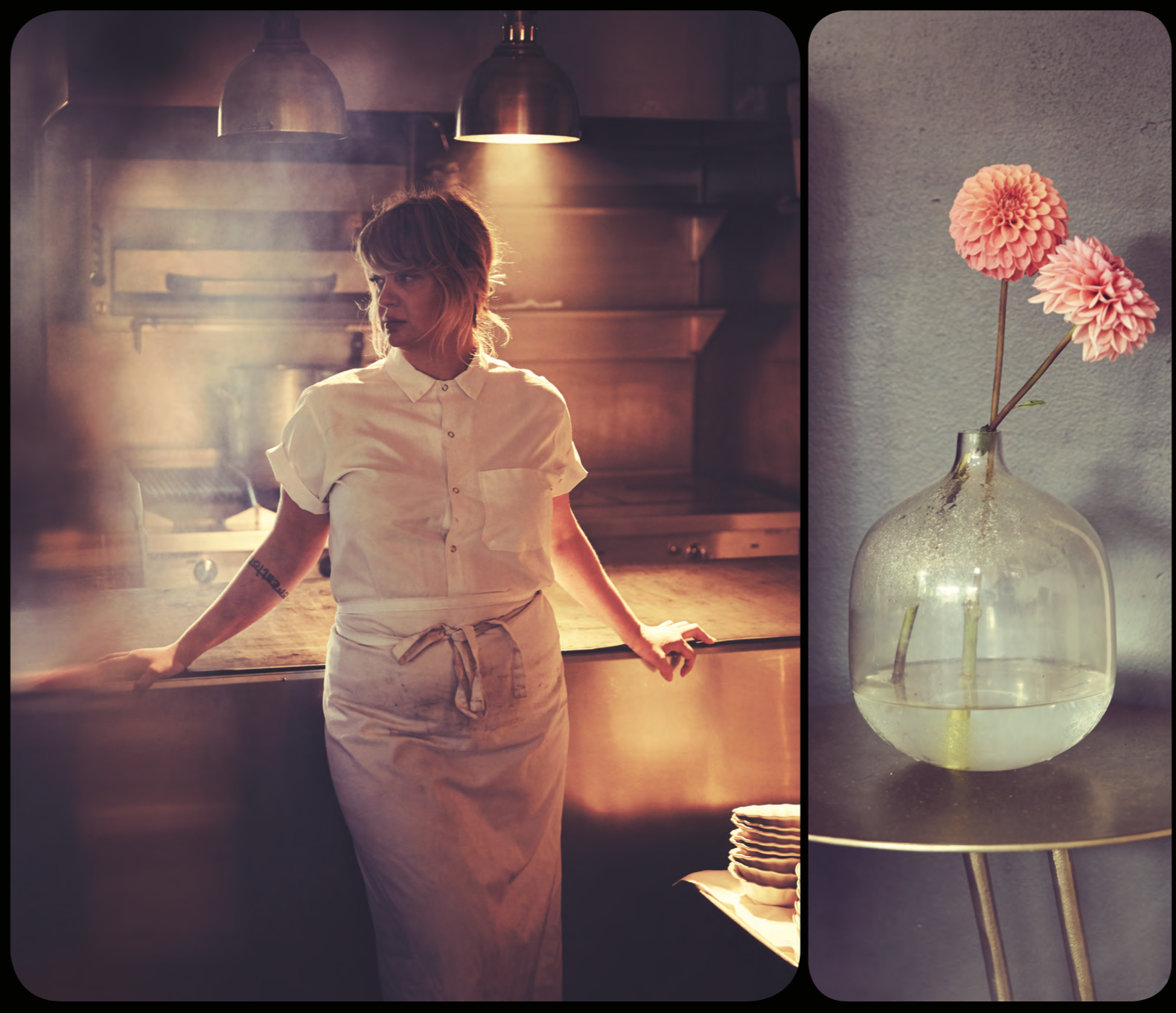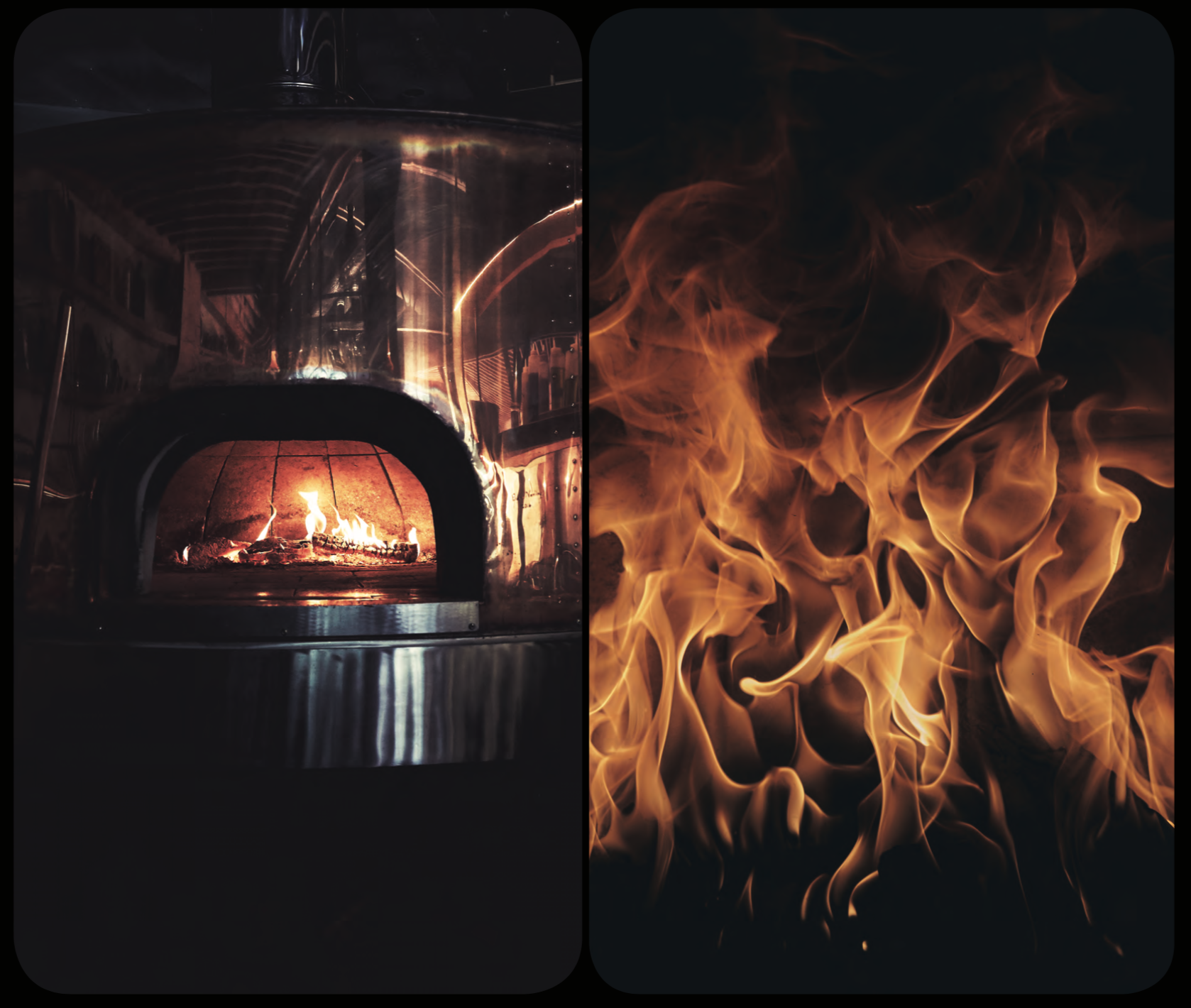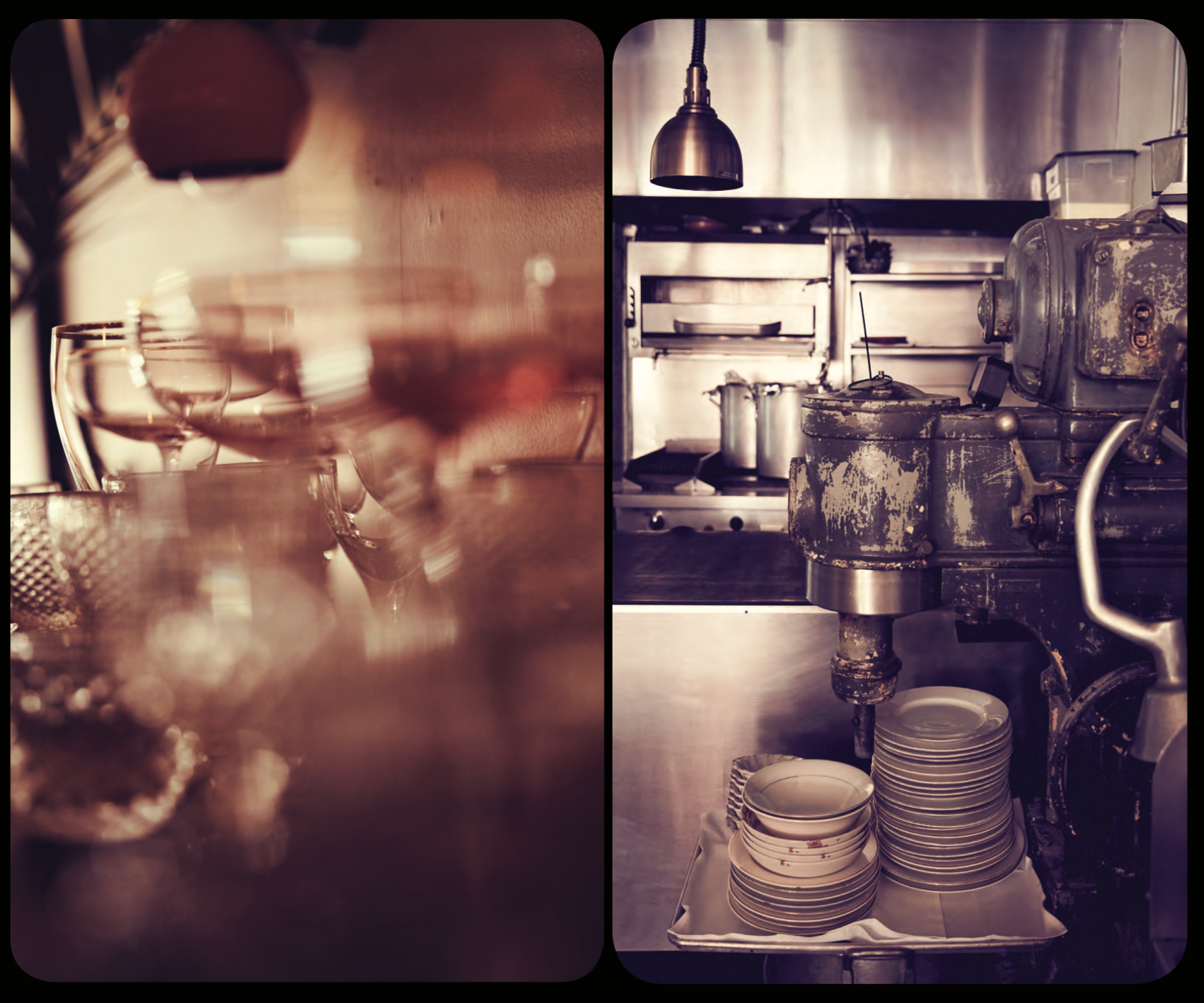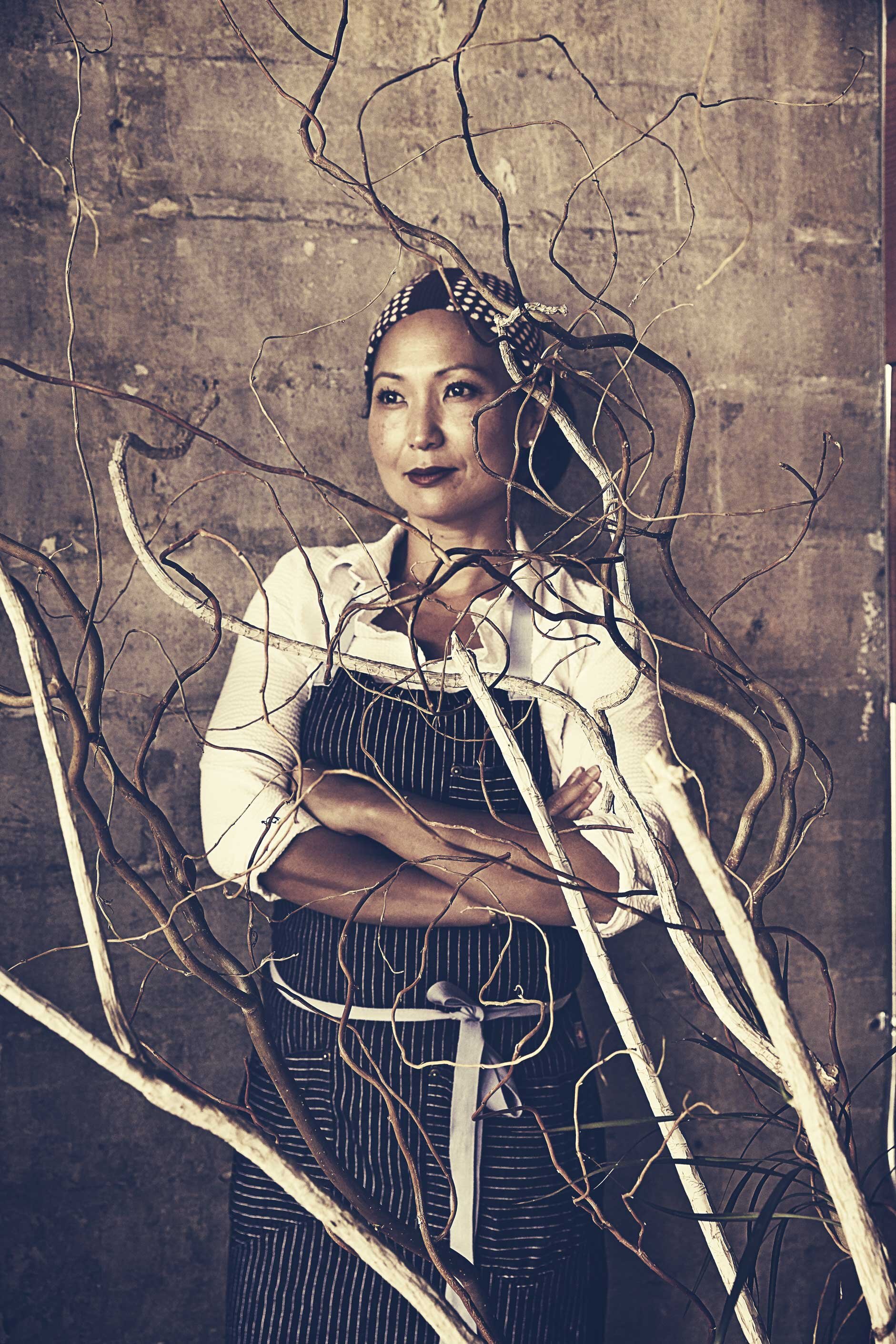The Future Is Now
How three James Beard Award–nominated chefs are creating the worlds they want to live in
By Molly Each, Executive Editor
Photography by Bill Phelps
This story appears in print in Vol. 1, No. 1 of Meal Magazine, published in January 2020. Click here to order yours.
Preface to the digital version:
“Disasters are extraordinarily generative,” writes Rebecca Solnit in A Paradise Built in Hell, her excellent account of the “utopias” that arise when everything seems to have gone wrong. “[T]here is no simple formula for what arises: it has everything to do with who or what individuals or communities were before the disaster….”
That is, the resilience and innovation of restaurateurs who have, in this moment of pandemic, become advocates, fundraisers, and donors, fighting to save their businesses and care for their imperiled workers and communities, would be no surprise to Solnit — and it’s no surprise to us. That their efforts have been so nimble and creative is evidence that, for years, many in the food service industry have cultivated networks of social responsibility made so plain today.
We are watching as a swath of restaurant owners and workers keep forging ahead to adapt their businesses, provide food to those in need, organize support groups for industry folks suffering with addiction, depression, stress, and a host of other struggles, and feed medical workers in the trenches. This is an inspiring extension of care work that began well before this crisis and will continue long after it abates.
In Issue 1 of Meal Magazine, we documented many stories of the people working against the image of kitchens and bars suffused with toxicity and competition. Today, the same folks are leveraging their culture of care to weather the storm. That’s why we’re releasing a couple of our features online now: they remind us of the importance of building connection, not only to create a livable present, but also a community on which we can count in times of extreme uncertainty.
Yes, the stories look and feel different on the printed page, where the dreamy documentary photography of Bill Phelps and the retrofuturist design of Jake Luck really shine (and if you’d like to have your own copy, you can order one today and we’ll send it in the mail ASAP). Still, in a moment when we need stories of hope, we’ve decided to make these just a bit more shareable. Please enjoy.
— The Meal Magazine Team, April 2020
When Ann Kim, chef-owner of Young Joni, Pizzeria Lola, and Hello Pizza, won the 2019 James Beard Award for Best Chef: Midwest, she was alongside fellow Minneapolis-based finalists Jamie Malone (Grand Cafe, Eastside) and Christina Nguyen (Hola Arepa, Hai Hai).
Kim's personal speech received a thunderous reception, and post-event, the culinary world turned to take notice of three chefs from the same city who shared a similar goal: to change the culture of the restaurant industry while making great food, on their own terms.
The media coverage has largely focused on neatly packaged narratives: Women! Chefs! Changing food in Minnesota! And while true—and inspiring—those simple facts obscure the larger story of three chef-owners who have built vibrant, thriving restaurants from the ground up through culinary talent, uncompromising vision, and an unstoppable work ethic.
We popped a bottle of Marc Hébrart Champagne with Kim, Malone, and Nguyen in photographer Bill Phelps’s Northeast Minneapolis studio, and let the conversation flow.
Molly Each: Tell me about the whole Beards experience: What was the lead up like, what was the actual ceremony like? Any good anecdotes? Anyone get hammered?
Jamie Malone: I got hammered after the ceremony. [laughs]
Ann Kim: There’s actually no concessions at the ceremony. You think there would be food and drinks and people up and down the hallways, but there’s none of that.
Christina Nguyen: There were some chickpeas. Some dried chickpeas.
Kim: I’d say if they did it over again, that they’d definitely have Champagne flowing in the auditorium, and food. It’s awkward to just sit in the seats, so it’s like, we need a glass of Champagne.
Nguyen: I feel like it was intentional though. They were like, “People are going to get rowdy, it’s gonna get weird.”
Kim: Well, that group of people.
Nguyen: We can’t be trusted. Luckily, we snuck in some canned Lambrusco, right, Ann? So we were fine.
Each: Were you nervous during the ceremony?
Kim: No, I don’t know. I’m speaking for myself, but I was just thrilled to be there—to be acknowledged in that way, to be with my friends, my colleagues, people I respect and have respected over the years. So if anything, I was probably nervous to run into people that I really respect and tell them how much I adore what they’ve been doing and how much respect I have for them. For me it was just fun, and it was really a blast being there with these two awesome, talented, amazing boss ladies. Hearing my name was just icing on the cake, but it wasn’t an expectation, it wasn’t anything I imagined for myself. I think I was hyperventilating through most of it.
Malone: I felt the same, just being overwhelmed by the people in the room. There were people that you look up to your whole life and you’re just sitting in that room [together]. I wasn’t nervous, but I felt the same feeling of like, “If I run into this person, how do I possibly express how they impacted me?”
Each: Did you have any memorable encounters?
Malone: No, I’m really shy so I just kept my head down.
Nguyen: Yeah, I think I awkwardly fan-girled a few people. And then I was like, “OK, bye, I’m going to go now.”
Kim: I mean, they’re all just people, right? But like Jamie said, so many of these people are like, heroes of yours, or people that you’ve looked up to. For me, it was at the after party at Girl & the Goat. I had met Daniel Boulud before, but he came up to me and I don’t know if it was his French accent or how charming he is, but he came up to me held my hand and said, “Thank you for your words,” and [told me] the speech brought him to tears, reminded him of his parents and his heroes who influenced him and his cooking. That was probably a highlight for me.
Nguyen/Malone: Yeah, for sure.
Kim: And he kisses you on both cheeks and his accent is so charming, it’s just like sigh.
Malone: When I was in Aspen for Food & Wine in 2013, we were at this party on the top of the mountain and same thing, it’s like everyone’s there. And Thomas Keller came up to me and was talking about what an honor it is to win that award, and he leaned in and was like, “Don’t fuck it up!”
Nguyen: That’s awesome.
Each: How did you respond to that?
Malone: “Yes, chef. Yes, chef.” [all laugh]
Each: When you’re opening a restaurant, are you thinking about awards?
Malone: I think I put enough pressure on myself. I’m enough of my own barometer. I don’t need to stress about other stuff, too.
Kim: I am my own worst critic. Nobody is as hard on me as myself. I don’t think any of us went into this because we wanted to win awards or be on TV. Even though I was awarded with being "the best" chef in the midwest, I truly don't believe that there's such a thing as being "the best" in anything. I like to think that I work to always do my best and put my best forward … but so do Jamie and Christina, and any one of us could have won it. We all love hospitality, we love feeding people, we love the feeling that it brings when people light up after having a bite. And there’s less and less of that happening now, and I’m just happy I can provide a space where people can do that.
“We all love hospitality, we love feeding people, we love the feeling that it brings when people light up after having a bite.”
Each: All of your restaurants offer amazing holistic experiences. From the moment you walk in the door, every detail has been carefully chosen. What does hospitality mean to each of you? How do you practice it every day?
Nguyen: I think that hospitality for us is letting somebody into your space, having them escape their life for a little while or just engage with whoever they’re dining with. Being able to let you worry about taking care of them instead of them having to worry about everything.
Malone: Yeah, to pamper people, be an oasis in their life.
Nguyen: Exactly.
Malone: We talk more and more about it—we’re in the business of love and kindness. Food and drinks are part of it, but we focus on showing people love. Because in our world, that just doesn’t happen that much. And I think it starts with staff. We always say that staff comes first, before anything else, guests or finances. I hope it’s the right decision! No, it is. We try to focus on creating a loving and respectful atmosphere, even when there are no guests there. I truly believe you can feel it when you walk in the room.
The other part is, I try really hard to curate everything. I know exactly how I want you to feel when you’re in Grand Cafe or Eastside. The playlists are different, the serviceware is different, the style of service is super different. We try to curate these little nuances that you might not know are affecting you, but hopefully they’re helping create this feeling. You just don’t have to worry about anything because you’re just enveloped in this feeling that we’re trying to create.
Kim: The three of us are unique because we’re chef-owners. It’s a blessing and a curse, in that we ultimately have agency in what we do. But I think what that also means is that we’re in it. If you’re the chef, your focus is on making really great food. But as owners, we’ve got financial responsibilities, not just the human responsibility, so we want to make sure the entirety of the experience is wonderful. We probably each have different ideas of what that is, but at the core of it, we’re focused on every detail. It’s not just about the food. It’s about the seat you’re sitting in, the plants in the vestibule, the music being played. Restaurants should be about feeling. So we try to create experiences that make it feel special. And we stress this to our entire team—this isn’t just about going out to eat. We want you to walk in and feel like you’re getting a giant hug. Leave all your problems at the door, let us take care of you. That’s our purpose.
Each: What a gift — life is so insane, and can be really hard, and you get to provide this opportunity for people to step out of it for a second.
Malone: I’ve been a chef for a long time, and owning the restaurant, I didn’t realize how intensely fulfilling that would be. That’s where my fulfillment comes from. And it’s changed me as a person. Because I didn’t realize I needed to have those things to fulfill me, but now that I do, I feel like a very complete person. And it comes with stress, as we all know, but the other stuff makes it worth it.
Kim: People get into this because they love to cook. But I love the entire process, from beginning to end. We’ve all created restaurants from inception to watching [them] grow. For me, it’s not about forgetting life, it’s about actually engaging in life. We’ve never been more connected digitally, but we’re completely disconnected in the important ways. When you go to a restaurant—sure, there are people Instagramming food and taking pictures, but it’s really a time to slow down and connect and have a glass of wine and share each other’s victories, sadness, whatever. We all gotta eat; that’s one thing we all have in common. So we’re going to give them a place that’s special to do it.
Each: Are there details in your restaurants that maybe not everybody notices, but you feel like they’re essential?
Malone: My restaurants are very different from each other, but I try to carry motifs through both of them that are opposites. I like to think of Grand Cafe like we’re in a Wes Anderson movie. That’s what I tell the servers.
Nguyen: Now that you say that, that is totally spot-on!
Malone: Food [almost always] goes out on vintage serving trays, and [the servers] have to hold their elbows up, because if it was a Wes Anderson movie, that’s how they’d be moving. And it’s all this tarnished sterling, and intentionally things look used. At Eastside, it’s a lot more family-style food, and [it goes] out on these super modern, black glossy trays. We tell the servers, “Walk like you’re a robot.” I don’t know if people notice it or not, but there’s a lot of motifs that we try to bounce off of each other.
Nguyen: There’s definitely a vibe at your restaurants, for sure.
Malone: Thank you. I know, I’m like, “Can you guys all wear black turtlenecks too?” [laughs]. It went out the window for summer!
Nguyen: We designed every element of both [restaurants], and a lot of it is based on nostalgia. At Hai Hai, for example, I use a lot of blue and white pottery because that’s what my grandparents had in their house. Or like, the little jasmine tea containers were from my childhood; we used [them] to store pennies that we played poker with. We thought we were like, the only ones that had this container, but there are actually a lot of them! But it’s special—the space is full of that.
Malone: Even though someone would never be able to go, “Oh, this is from Christina’s grandmother’s kitchen,” you can still feel that DNA. It’s palpable. Because I think we’ve all been to restaurants where it’s like, “Well, this is a bunch of random shit thrown together.”
Nguyen: Without intention.
Each: Or like, “I saw this at two other restaurants last week,” because nobody is picking unique chairs or whatever it is.
Kim: “Is this the restaurant that Pottery Barn decorated?” [all laugh]. I love what all of us do at our restaurants. They have personality, and I think it tells our stories in a unique way. Do we scream that at people? Absolutely not. We want people to feel good and welcome and comfortable. The back bar at Young Joni, for instance—totally inspired by my husband’s family cabin. It was a trailer, it’s a dump, but it has so many memories. It’s where the adult kids go to hang out, drink bad beer, and stay up late and do puzzles. And I was like, that’sthe feeling. We tried to create that without replicating it, because you can’t replicate. People walk out and they’re like, “This is like my cool uncle’s basement!” It creates a memory for them that makes it feel like it’s theirs. That’s what I really love.
Each: I love seeing restaurateurs’ grace and kindness when they interact with super difficult customers. It feels like a moment of true hospitality. Do you have moments you can think of where you’ve thought, this is hospitality?
Kim: Oh, tons. That’s why—because there are a lot of shitty days in the restaurant business.
Malone: There sure are.
Kim: It’s an industry that’s damaged, a lot of things are fucked up. We try to set the scene for people, because we’re in the business of hospitality. But what people don’t know is the flip side—our dishwasher didn’t show up that night, or half the line didn’t show up. But the show must go on! And I don’t know if it’s because of my background as an actor where it’s like, it doesn’t matter. But you know, it’s hard. So what keeps me in it are those experiences. And I can think of a million different things, but one that just happened recently: I got an Instagram message from a guest at Pizzeria Lola. And he sent it with a picture of his server, Liz, who has been with us almost since the beginning, and Lola will celebrate 9 years this November. And he basically said, “For the last 10 months, we get the same four pizzas every Sunday, and Liz is always there. We do this because 10 months ago, my father was diagnosed with Stage 4 pancreatic cancer. So every Sunday, we get the same four pizzas and we go over to his house and just share in the food that he loves and we laugh and embrace this moment.” And he said, “We’ve told Liz this off and on, and when we came in this past Sunday to pick up our order, she took care of it for us. It might have seemed like a small gesture [to comp our bill that night], but I just want you to know that it meant more than you know.”
I tell our team all the time—you never know. We say it’s about compassion. Sometimes people come in and they act like assholes and they’re very demanding, but you don’t know what they went through. We have to be compassionate. And it’s not always easy. Lola is open from lunch through dinner, there’s no cut in service. And at restaurants, sometimes when it’s three o’clock and nobody is in the restaurant, and you have one person on staff, you can kind of blow it off. But this family walked in, two older sons, an older gentleman. They sat [at the bar] and ordered the special. And before they left, he turned around and waved the server down and said, “I just want you to know that we just happened to drive by from my wife’s funeral. I remember having a really lovely experience with my wife about the same time last year, and we sat at these two seats at the counter, and the special you were running at the time was called the Sweetie Pie.”
At this point, everyone in the room chokes up, and Kim takes a pause.
Each: We’re right here with you.
Kim: And he said, “I looked over at my wife and said, ‘I’m sharing a sweetie pie with my sweetie pie.’ And I feel like she is with me today, and thank you for being here for me.” Those are those moments, right? Everyone is your VIP, and it’s about compassion. And if we can share that through a slice, a glass of wine—it’s not rocket science. It’s just food. But I like to think it’s something more than that.
Each: [to Malone and Nguyen] Any moments for you guys that come to mind?
Malone: I can’t go after that!
“I want to sleep well at night, and know that I did everything I could for everybody.”
Nguyen: Follow that, Jamie! [all laugh]
Malone: I have the same ethos. It’s our job to do our absolute best every single day with every single dish at every single table because you never know how important this is to somebody. I’ve always been obsessed with food and cooking, but also with restaurants for that reason, because in my family, all of our special moments occurred in restaurants. So it’s this gift you can give people. But we’ll [have guests] dining because they’re in chemo, and maybe it’s their last opportunity to go out. You email back and forth with them, and it feels like a huge responsibility—and how often does it happen and we don’t even know?
I love what you said about compassion, and we talk about vulnerability, too. In the service industry it’s really easy to mistake being friendly as being enough. But we need to go above and beyond. We do it in the food, and we try to do it in other ways. Sometimes people will put in their reservation that it’s their anniversary—this is a simple example, but we use it in the restaurant a lot. It can feel awkward to say happy anniversary to someone. Because in our world it feels like an invasion of privacy or intrusive or something. But it’s like, they put that in there, so now we have to do this slightly awkward thing of making a big deal out of it, and that feels vulnerable. But we do it, and then I think you open up the space and opportunity to have those really important moments that go way beyond having a meal in a restaurant.
Nguyen: I definitely like what you guys said about treating everyone like a VIP, because you don’t know what space people are in when they’re coming to your restaurant. One thing we always try to teach our staff is empathy. Even though we all do pretty high volume and [our] restaurants are busy, you have to treat everybody with empathy, understanding, and respect. And I think the only way you can have your staff show that empathy to people is by also showing empathy to them. So we try to have a very understanding, loving work environment where people feel that, and then they radiate it. Because you can’t just tell somebody “be empathetic” and then you throw a pot at them or something.
Malone: When you’re supposed to be the boss, it’s like, “Am I also supposed to be the person you get a hug from when you’re having a bad day? Does that work?” It totally works. It just is not always how people envision that role. But we try to do that. Mental health is a big area where we can show people that we see them as not only humans, but humans that we care deeply about. We say “employees first” and then we actually have to be like, no, we mean that. Like [if you’re having a bad day], you can go home, we’ll figure this out. And you can do that and hold people to high standards, because they’re both good for everyone.
Kim: As bosses, there’s a certain level of power that we have and people aren’t going to want to come up and tell us how they’re really feeling. We say throw that out the window. We want you to speak your truth. As a matter of fact, we demand that you are always honest with us. We’re a society rooted in fear—unfortunately, that’s how we roll. But we try to say, “That’s not the way we roll.” I can’t change the industry alone, but we can try to change how we run things at our restaurants. Having not come up through the ranks of working in kitchens, I came into this kind of green. I kept asking myself, “I don’t know how it’s supposed to be, but how do I want it to be?” Like, this is the environment I want to work in, and this is what I’m going to practice. I think a lot of young cooks come into our organization and they expect a certain way of working. And they’re surprised. At first they don’t trust it. They’re like, “Wait a minute, what are you going to ask of me next?”
Malone: Like there is a hidden agenda.
Kim: Yeah, because a lot of these young cooks come from control-and-command kitchens, ruled by fear. Like I said, restaurants are hard, man, so it’s stressful and I understand where it comes from. But I also know that is not the way to sustain a viable business. We’re going to be compassionate and empathetic, and we’re going to listen. I also have really high standards. Now that we’re going on four restaurants, you have to be super clear about your expectations and lay that out. Because so many times people are like, “I didn’t know that’s what you wanted.” And it’s like, “Oh yeah, shit, I never told you.”
Malone: That resonates with me because my whole drive—it’s never about awards, it’s not necessarily about financial gain, it’s not about typical barometers of success. It’s the ability to create the world I want to live in. My world is 99 percent in the restaurants, so if I get to create this world that I desire, I get to live in it. How great is that?
Nguyen: I agree with that completely. You spend a lot of time at work, why would you create an environment that’s uncomfortable for you and other people? I think a lot of people think kitchens can only be led by an angry chef, yelling and demeaning them. But our approach is getting people invested in you, in your restaurant. That’s how you get people to want to make great food, not by scaring them into it. What kind of imprint does that leave on you as a person? I don’t want to have that weight on me. I want to sleep well at night, and know that I did everything I could for everybody.
Malone: I think [in] those intense kitchens, chefs are never trained how to be managers and how to run businesses. And so that intensity is a cheap and easy way to feel like you’re being productive when you’re super-duper not. I think a lot of kitchens and chefs and cooks create that because it makes them feel accomplished. Because if you have a smooth, glorious, elegant service, you’re kind of like, that’s it? Cooking is very hard, but it’s also not that hard. Put your head down, do your job right, be ready for service, and don’t be an asshole.
Nguyen: It’s so easy.
Kim: What Jamie said is absolutely right. Most chefs don’t come in prepared to lead or manage or communicate. They can brunoise a carrot, but can they have a meaningful conversation or resolve conflict in a way that makes sense? Usually no. It’s usually like, “Shut up and cook.” That works in the moment, but you’re probably going to lose that young cook. I know culinary schools are closing down, but we should put just as much emphasis [on] leadership, mentorship, compassion—they should read books about that, just as much as they learn how to like, quenelle ice cream.
Malone: You learn that in culinary school? [laughs.]
Nguyen: Quenelle 101.
Kim: I never went, so … [all laugh]. Maybe that’s something you learn on the job!
Each: How do you balance keeping favorites on the menu while challenging yourselves to try new things, and challenging your diners to break out of what is comfortable?
Malone: I keep a relatively static menu at Grand, because it’s the kind of restaurant that I want it to be. I’d say we rotate about 30 percent of the menu on a very regular, seasonal basis. We’re so based in technique that it takes a while to get things perfect and how we want it. You have to find that balance where your kitchen is producing it accurately, but they’re not getting bored by it. I’m less apt to change things frequently. I also think it’s more of a cheffy ego thing to change the menu all the time. I think it shows a lot more discipline to keep cooking the same thing and just absolutely nail it every time. I think you please more diners. I think the idea of creativity in food is a little bit overrated. I don’t know how you guys feel about that.
“In the service industry, it’s easy to mistake being friendly as being enough. But we need to go above and beyond.”
Kim: I agree.
Malone: I don’t get a lot of satisfaction from throwing together a whole bunch of shit that maybe seems cool on paper. I would way rather be the best at making one thing. I think about that a lot, ‘cause I’m like, “Do diners get bored with my menu?” I don’t have the answer.
Nguyen: I don’t think so. I never get bored of the food there.
Kim: No, no. And I totally agree. There are chefs [who] constantly change and reinvent and innovate. And, you know, do your thing! It’s definitely not what we do. I’m passionate about craft, and “craft,” to me, means repetition and practice. When we opened Lola, I was obsessed with pizza. I was obsessed with making really great dough and the kind of crust I wanted to eat. It was all in my head, I knew exactly what I wanted it to look like, taste like, smell like, the mouthfeel, the chew. I geek out on this kind of stuff. I read books and then I tweak things, and to me that’s really exciting. And I’ve found a lot of young cooks hate that. They’re bored. I’d say, “We’re a pizzeria first,” and they’re like, “Oh great, what else are we going to do?” And it’s like, this is our bread and butter. You need to get this down. What they don’t understand is dough is a living, breathing thing. It changes. You have to be flexible and adapt. When it’s 80 percent relative humidity, you better adapt how long that poolish sits, and how you will be able to accommodate if your dough blows. To me, that’s the whole foundation of what we do. And they think, “It’s just pizza.”
Malone: It’s always those cooks who are like, “Show me something new,” and it’s like, “Why don’t you just learn how to make dough? That’s what we do.”
Kim: “Once we get this down, then we can talk about whatever foam you want to make.”
Malone: Or not!
Nguyen: Or we’ll just never talk about that foam.
Kim: Because I actually don’t know how to do that, and I don’t want to—all respect to those people that do. I’m also obsessed about consistency. The other night I was at the restaurant and the bartender introduced me to a couple that have been regulars, and they said that the one thing you guys really nail is that we came here when you first opened and now you’re almost three years old and it’s the same. And they meant like, it’s always good.
Malone: Best compliment.
Kim: It’s the best compliment I could ever, ever hear. Because it’s been a pet peeve of mine to go to a restaurant that you fall in love with and then something happens, and then it’s like another restaurant. I don’t want to be that. I don’t open restaurants to be the restaurant of the moment or the hour. I want to be a restaurant that is here when I’m gone. That’s my goal. So I’m less concerned about [doing] something different all the time. At Young Joni, we switch out [a few dishes] seasonally from each category to reflect the vegetables or to keep the cooks interested. But otherwise, our menus are pretty static, too.
Nguyen: I would say the same for both of my restaurants as well, just changing some things seasonally. People come in because hopefully they want to eat the food that we’ve made every day, over and over. Consistency is so important. And I think it’s lost on some people that making the same thing over and over—the same every time—is really, truly where the craft is, because with every dish, you have an opportunity to make a mistake. But having there not be mistakes? It’s fucking impossible.
Malone: That’s a true thing to chase as an accomplishment.
Nguyen: Exactly.
Malone: Other than, “Oh, I roasted salsify in charcoal.” Like,who cares?
Kim: Yeah, who cares and does anyone want to eat that, and who knows what salsify is? It’s [about] comfort. Making people feel good. I love comfort food, like the dishes you come back to over and over. Don’t get me wrong, I love to go out and do an elaborate tasting menu. But what I’m going to come to, time and time again, is that dish that makes me feel comfort. That’s what I want to cook, that’s what I want to eat, and that’s what I try to provide to my guests.
Malone: There’s also a lot of beauty in simplicity. It’s kind of an obvious statement, but again, people don’t take the time to realize that and appreciate that. And I think there’s a lot of beauty in how you serve something, doing it properly, having the proper service ware. I used to love tasting menus and be really obsessed with that stuff. I’m less interested in that now, but I’m still interested in how we can take care of guests where the onus isn’t on them to do all the ordering, they can just relax and have dinner happen. We try to explore different ways to make that happen without it being overly precious. I think we put more creativity in those things than in creating a new dish.
Kim: There’s so much talk about “What do you do, what kind of food do you make?” I don’t know. Delicious food? Each of us has a way in which we present our food and our restaurants and our point of view, but in the end, you want people to enjoy. I watch people when they eat from time to time, and I love it when they put something in their mouth and they’re like, sigh. Or they roll their eyes back and it’s like, yes! That’s awesome.
Each: Jamie, Christina, how are you taking in the guest experience?
Malone: Through the expo line. I can’t see the dining room at Grand from the expo line, so I read it through the tickets. I have a map in my head based on the tickets of how every table is eating. I can see the whole dining room; I know what’s going on. But when I was in an open kitchen and could see everyone eating everything, it was very hard not to become obsessed with it.
Nguyen: I think anyone who owns a restaurant is a little bit of a lurker. In the busiest parts of service, it’s hard because you have to keep your eyes on the tickets and whatever. But definitely if there’s a little break, I like to do some lurking on the guests—just a little pass through the dining room or something.
Malone: Yeah, I’ll pretend I’m changing the air conditioning. [all laugh]
Nguyen: Dimming the lights and just staring, that’s a big one! Just taking in the vibe of the dining room. Because at the best time there’s that energy and the dining room is just singing and everybody is just like, buzzing.
Kim: Yeah, there’s that feeling when everything is just running seamlessly. The kitchen is just on fire, the dining room is humming, the service staff is happy, that’s an amazing feeling. The energy is just tremendous. It’s just flow.








